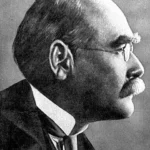 | |
Bread Upon The Waters | |
| Author | Rudyard Kipling |
|---|---|
| Published |
1896
|
| Language | English |
| Nationality | British |
| Genre | Adventure, Children's Literature |
1896 Short Story
Bread Upon The Waters
Bread Upon The Waters is an English Adventure, Children's Literature short story by British writer Rudyard Kipling. It was first published in 1896.
Bread Upon The Waters
by Rudyard Kipling
If you remember my improper friend Brugglesmith, you will also bear in mind his friend McPhee, Chief Engineer of the Breslau, whose dingey Brugglesmith tried to steal. His apologies for the performances of Brugglesmith may one day be told in their proper place: the tale before us concerns McPhee. He was never a racing engineer, and took special pride in saying as much before the Liverpool men; but he had a thirty-two years’ knowledge of machinery and the humours of ships. One side of his face had been wrecked through the bursting of a pressure-gauge in the days when men knew less than they do now, and his nose rose grandly out of the wreck, like a club in a public riot. There were cuts and lumps on his head, and he would guide your forefinger through his short iron-grey hair and tell you how he had come by his trade-marks. He owned all sorts of certificates of extra-competency, and at the bottom of his cabin chest of drawers, where he kept the photograph of his wife, were two or three Royal Humane Society medals for saving lives at sea. Professionally – it was different when crazy steerage-passengers jumped overboard – professionally, McPhee does not approve of saving life at sea, and he has often told me that a new Hell awaits stokers and trimmers who sign for a strong man’s pay and fall sick the second day out. He believes in throwing boots at fourth and fifth engineers when they wake him up at night with word that a bearing is redhot, all because a lamp’s glare is reflected red from the twirling metal. He believes that there are only two poets in the world; one being Robert Burns, of course, and the other Gerald Massey. When he has time for novels he reads Wilkie Collins and Charles Reade chiefly the latter – and knows whole pages of “Very Hard Cash” by heart. In the saloon his table is next to the captain’s, and he drinks only water while his engines work.
He was good to me when we first met, because I did not ask questions, and believed in Charles Reade as a most shamefully neglected author. Later he approved of my writings to the extent of one pamphlet of twenty-four pages that I wrote for Holdock, Steiner & Chase, owners of the line, when they bought some ventilating patent and fitted it to the cabins of the Breslau, Spandau, and Koltzau. The purser of the Breslau recommended me to Holdock’s secretary for the job; and Holdock, who is a Wesleyan Methodist, invited me to his house, and gave me dinner with the governess when the others had finished, and placed the plans and specifications in my hand, and I wrote the pamphlet that same afternoon. It was called “Comfort in the Cabin,” and brought me seven pound ten, cash down – an important sum of money in those days; and the governess, who was teaching Master John Holdock his scales, told me that Mrs. Holdock had told her to keep an eye on me, in case I went away with coats from the hat-rack. McPhee liked that pamphlet enormously, for it was composed in the Bouverie-Byzantine style, with baroque and rococo embellishments; and afterwards he introduced me to Mrs. McPhee, who succeeded Dinah in my heart; for Dinah was half a world away, and it is wholesome and antiseptic to love such a woman as Janet McPhee. They lived in a little twelve-pound house, close to the shipping. When McPhee was away Mrs. McPhee read the Lloyds column in the papers, and called on the wives of senior engineers of equal social standing. Once or twice, too, Mrs. Holdock visited Mrs. McPhee in a brougham with celluloid fittings, and I have reason to believe that, after she had played owner’s wife long enough, they talked scandal. The Holdocks lived in an old-fashioned house with a big brick garden not a mile from the McPhees, for they stayed by their money as their money stayed by them; and in summer you met their brougham solemnly junketing by Theydon Bois or Loughton. But I was Mrs. McPhee’s friend, for she allowed me to convoy her westward, sometimes, to theatres where she sobbed or laughed or shivered with a simple heart; and she introduced me to a new world of doctors’ wives, captains’ wives, and engineers’ wives, whose whole talk and thought centred in and about ships and lines of ships you have never heard of. There were sailing-ships, with stewards and mahogany and maple saloons, trading to Australia, taking cargoes of consumptives and hopeless drunkards for whom a sea-voyage was recommended; there were frowzy little West African boats, full of rats and cockroaches, where men died anywhere but in their bunks; there were Brazilian boats whose cabins could be hired for merchandise, that went out loaded nearly awash; there were Zanzibar and Mauritius steamers and wonderful reconstructed boats that plied to the other tide of Borneo. These were loved and known, for they earned our bread and a little butter, and we despised the big Atlantic boats, and made fun of the P. & O. and Orient liners, and swore by our respective owners – Wesleyan, Baptist, or Presbyterian, as the case might be.
I had only just come back to England when Mrs. McPhee invited me to dinner at three o’clock in the afternoon, and the notepaper was almost bridal in its scented creaminess. When I reached the house I saw that there were new curtains in the window that must have cost forty-five shillings a pair; and as Mrs. McPhee drew me into the little marble-papered hall, she looked at me keenly, and cried:
“Have ye not heard? What d’ ye think o’ the hatrack?”
Now, that hat-rack was oak-thirty shillings, at least. McPhee came down-stairs with a sober foot – he steps as lightly as a cat, for all his weight, when he is at sea – and shook hands in a new and awful manner – a parody of old Holdock’s style when he says good-bye to his skippers. I perceived at once that a legacy had come to him, but I held my peace, though Mrs. McPhee begged me every thirty seconds to eat a great deal and say nothing. It was rather a mad sort of meal, because McPhee and his wife took hold of hands like little children (they always do after voyages), and nodded and winked and choked and gurgled, and hardly ate a mouthful.
A female servant came in and waited; though Mrs. McPhee had told me time and again that she would thank no one to do her housework while she had her health. But this was a servant with a cap, and I saw Mrs. McPhee swell and swell under her garance-coloured gown. There is no small free-board to Janet McPhee, nor is garance any subdued tint; and with all this unexplained pride and glory in the air I felt like watching fireworks without knowing the festival. When the maid had removed the cloth she brought a pineapple that would have cost half a guinea at that season (only McPhee has his own way of getting such things, and a Canton china bowl of dried lichis, and a glass plate of preserved ginger, and a small jar of sacred and Imperial chow-chow that perfumed the room. McPhee gets it from a Dutchman in Java, and I think he doctors it with liqueurs. But the crown of the feast was some Madeira of the kind you can only come by if you know the wine and the man. A little maize-wrapped fig of clotted Madeira cigars went with the wine, and the rest was a pale blue smoky silence; Janet, in her splendour, smiling on us two, and patting McPhee’s hand.
“We’ll drink,” said McPhee, slowly, rubbing his chin, “to the eternal damnation o’ Holdock, Steiner & Chase.”
Of course I answered “Amen,” though I had made seven pound ten shillings out of the firm. McPhee’s enemies were mine, and I was drinking his Madeira.
“Ye’ve heard nothing?” said Janet. “Not a word, not a whisper?”
“Not a word, nor a whisper. On my word, I have not.”
“Tell him, Mac,” said she; and that is another proof of Janet’s goodness and wifely love. A smaller woman would have babbled first, but Janet is five feet nine in her stockings.
“We’re rich,” said McPhee. I shook hands all round.
“We’re damned rich,” he added. I shook hands all round a second time.
“I’ll go to sea no more – unless – there’s no sayin’ – a private yacht, maybe – wi’ a small an’ handy auxiliary.”
“It’s not enough for that,” said Janet. “We’re fair rich – well-to-do, but no more. A new gown for church, and one for the theatre. We’ll have it made west.”
“How much is it? ” I asked.
“Twenty-five thousand pounds.” I drew a long breath. “An’ I’ve been earnin’ twenty-five an’ twenty pound a month!”
The last words came away with a roar, as though the wide world was conspiring to beat him down.
“All this time I’m waiting,” I said. “I know nothing since last September. Was it left you?”
They laughed aloud together. “It was left,” said McPhee, choking. ” Ou, ay, it was left. That’s vara good. Of course it was left. Janet, d’ ye note that? It was left. Now if you’d put that in your pamphlet it would have been vara jocose. It was left.” He slapped his thigh and roared till the wine quivered in the decanter.
The Scotch are a great people, but they are apt to hang over a joke too long, particularly when no one can see the point but themselves.
“When I rewrite my pamphlet I’ll put it in, McPhee. Only I must know something more first.”
McPhee thought for the length of half a cigar, while Janet caught my eye and led it round the room to one new thing after another – the new vine-pattern carpet, the new chiming rustic clock between the models of the Colombo outrigger-boats, the new inlaid sideboard with a purple cut-glass flower-stand, the fender of gilt and brass, and last, the new black-and-gold piano.
“In October o’ last year the Board sacked me,” began McPhee. “In October o’ last year the Breslau came in for winter overhaul. She’d been runnin’ eight months – two hunder an’ forty days – an’ I was three days makin’ up my indents, when she went to dry-dock. All told, mark you, it was this side o’ three hunder pound – to be preceese, two hunder an’ eighty-six pound four shillings. There’s not another man could ha’ nursed the Breslau for eight months to that tune. Never again – never again! They may send their boats to the bottom, for aught I care.”
“There’s no need,” said Janet, softly. “We’re done wi’ Holdock, Steiner & Chase.”
“It’s irritatin’, Janet, it’s just irritatin’. I ha’ been justified from first to last, as the world knows, but – but I canna forgie ’em. Ay, wisdom is justified o’ her children; an’ any other man than me wad ha’ made the indent eight hunder. Hay was our skipper – ye’ll have met him. They shifted him to the Torgau, an’ bade me wait for the Breslau under young Bannister. Ye’ll obsairve there’d been a new election on the Board. I heard the shares were sellin’ hither an’ yon, an’ the major part of the Board was new to me. The old Board would ne’er ha’ done it. They trusted me. But the new Board were all for reorganisation. Young Steiner – Steiner’s son – the Jew, was at the bottom of it, an’ they did not think it worth their while to send me word. The first I knew – an’ I was Chief Engineer – was the notice of the line’s winter sailin’s, and the Breslau timed for sixteen days between port an’ port! Sixteen days, man! She’s a good boat, but eighteen is her summer time, mark you. Sixteen was sheer flytin’, kitin’ nonsense, an’ so I told young Bannister.
“We’ve got to make it,’ he said. ‘Ye should not ha’ sent in a three hunder pound indent.’
“Do they look for their boats to be run on air?’ I said. ‘The Board’s daft.’
“‘E’en tell ’em so,’ he says. ‘I’m a married man, an’ my fourth’s on the ways now, she says.'”
“A boy – wi’ red hair,” Janet put in. Her own hair is the splendid red-gold that goes with a creamy complexion.
“My word, I was an angry man that day! Forbye I was fond o’ the old Breslau, I looked for a little consideration from the Board after twenty years’ service. There was Board-meetin’ on Wednesday, an’ I slept overnight in the engine-room, takin’ figures to support my case. Well, I put it fair and square before them all. ‘Gentlemen,’ I said, ‘I’ve run the Breslau eight seasons, an’ I believe there’s no fault to find wi’ my wark. But if ye haud to this’ – I waggled the advertisement at ’em -‘this that I’ve never heard of it till I read it at breakfast, I do assure you on my professional reputation, she can never do it. That is to say, she can for a while, but at a risk no thinkin’ man would run.’
“‘What the deil d’ ye suppose we pass your indents for?’ says old Holdock. ‘Man, we’re spendin’ money like watter.’
“‘I’ll leave it in the Board’s hands,’ I said, ‘if two hunder an’ eighty-seven pound is anything beyond right and reason for eight months.’ I might ha’ saved my breath, for the Board was new since the last election, an’ there they sat, the damned deevidend-huntin’ ship-chandlers, deaf as the adders o’ Scripture.
“‘We must keep faith wi’ the public,’ said young Steiner.
“‘Keep faith wi’ the Breslau, then,’ I said. ‘She’s served you well, an’ your father before you. She’ll need her bottom restiffenin’, an’ new bed-plates, an’ turnin’ out the forward boilers, an’ re-turnin’ all three cylinders, an’ refacin’ all guides, to begin with. It’s a three months’ job.’
“‘Because one employee is afraid? ‘says young Steiner. ‘Maybe a piano in the Chief Engineer’s cabin would be more to the point.’
“I crushed my cap in my hands, an’ thanked God we’d no bairns an’ a bit put by.
“‘Understand, gentlemen,’ I said. ‘If the Breslau is made a sixteen-day boat, ye’ll find another engineer.’
“‘Bannister makes no objection,’ said Holdock.
“‘I’m speakin’ for myself,’ I said. ‘Bannister has bairns. ‘An’ then I lost my temper. ‘Ye can run her into Hell an’ out again if ye pay pilotage,’ I said, ‘but ye run without me.’
“‘That’s insolence,’ said young Steiner.
“‘At your pleasure,’ I said, turnin’ to go.
“‘Ye can consider yourself dismissed. We must preserve discipline among our employees,’ said old Holdock, an’ he looked round to see that the Board was with him. They knew nothin’ – God forgie ’em – an’ they nodded me out o’ the line after twenty years – after twenty years.
“I went out an’ sat down by the hall porter to get my wits again. I’m thinkin’ I swore at the Board. Then auld McRimmon – o’ McNaughten & McRimmon – came, oot o’ his office, that’s on the same floor, an’ looked at me, proppin’ up one eyelid wi’ his forefinger. Ye know they call him the Blind Deevil, forbye he onythin’ but blind, an’ no deevil in his dealin’s wi’ me – McRimmon o’ the Black Bird Line.
“‘What’s here, Mister McPhee? ‘ said he.
“I was past prayin’ for by then. ‘A Chief Engineer sacked after twenty years’ service because he’ll not risk the Breslau on the new timin’, an’ be damned to ye, McRimmon,’ I said.
“The auld man sucked in his lips an’ whistled. ‘AH,’ said he, ‘the new timin’. I see!’ He doddered into the Board-room I’d just left, an’ the Dandie-dog that is just his blind man’s leader stayed wi’ me. That was providential. In a minute he was back again. ‘Ye’ve cast your bread on the watter, McPhee, an’ be damned to you,’ he says. ‘Whaur’s my dog? My word, is he on your knee? There’s more discernment in a dog than a Jew. What garred ye curse your Board, McPhee? It’s expensive.’
“‘They’ll pay more for the Breslau,’ I said. ‘Get off my knee, ye smotherin’ beast.’
“‘Bearin’s hot, eh?’ said McRimmon. ‘It’s thirty year since a man daur curse me to my face. Time was I’d ha’ cast ye doon the stairway for that.’
“‘Forgie’s all!’ I said. He was wearin’ to eighty, as I knew. ‘I was wrong, McRimmon; but when a man’s shown the door for doin’ his plain duty he’s not always ceevil.’
“‘So I hear,’ says McRimmon. ‘Ha’ ye ony objection to a tramp freighter? It’s only fifteen a month, but they say the Blind Deevil feeds a man better than others. She’s my Kite. Come ben. Ye can thank Dandie, here. I’m no used to thanks. An’ noo,’ says he, ‘what possessed ye to throw up your berth wi’ Holdock?’
“‘The new timin’,’ said I. ‘The Breslau will not stand it.’
“‘Hoot, oot,’ said he. ‘Ye might ha’ crammed her a little – enough to show ye were drivin’ her – an’ brought her in twa days behind. What’s easier than to say ye slowed for bearin’s, eh? All my men do it, and – I believe ’em.’
“‘McRimmon,’ says I, ‘what’s her virginity to a lassie?’
“He puckered his dry face an’ twisted in his chair. ‘The warld an’ a’,’ says he. ‘My God, the vara warld an’ a’ (But what ha’ you or me to do wi’ virginity, this late along?’
“‘This,’ I said. ‘There’s just one thing that each one of us in his trade or profession will not do for ony consideration whatever. If I run to time I run to time barrio’ always the risks o’ the high seas. Less than that, under God, I have not done. More than that, by God, I will not do! There’s no trick o’ the trade I’m not acquaint wi’ -‘
“‘So I’ve heard,’ says McRimmon, dry as a biscuit.
“‘But yon matter o’ fair rennin”s just my Shekinah, ye’ll understand. I daurna tamper wi’ that. Nursing weak engines is fair craftsmanship; but what the Board ask is cheatin’, wi’ the risk o’ manslaughter addeetional.’ Ye’ll note I know my business.
“There was some more talk, an’ next week I went aboard the Kite, twenty-five hunder ton, simple compound, a Black Bird tramp. The deeper she rode, the better she’d steam. I’ve snapped as much as eleven out of her, but eight point three was her fair normal. Good food forward an’ better aft, all indents passed wi’out marginal remarks, the best coal, new donkeys, and good crews. There was nothin’ the old man would not do, except paint. That was his deeficulty. Ye could no more draw paint than his last teeth from him. He’d come down to dock, an’ his boats a scandal all along the watter, an’ he’d whine an’ cry an’ say they looked all he could desire. Every owner has his non plus ultra, I’ve obsairved. Paint was McRimmon’s. But you could get round his engines without riskin’ your life, an’, for all his blindness, I’ve seen him reject five flawed intermediates, one after the other, on a nod from me; an’ his cattle-fittin’s were guaranteed for North Atlantic winter weather. Ye ken what that means? McRimmon an’ the Black Bird Line, God bless him!
“Oh, I forgot to say she would lie down an’ fill her forward deck green, an’ snore away into a twenty-knot gale forty-five to the minute, three an’ a half knots an hour, the engines runnin’ sweet an’ true as a bairn breathin’ in its sleep. Bell was skipper; an’ forbye there’s no love lost between crews an’ owners, we were fond o’ the auld Blind Deevil an’ his dog, an’ I’m thinkin’ he liked us. He was worth the windy side o’ twa million sterlin’, an’ no friend to his own blood-kin. Money’s an awfu’ thing – overmuch – for a lonely man.
I’d taken her out twice, there an’ back again, when word came o’ the Breslau’s breakdown, just as I prophesied. Calder was her engineer – he’s not fit to run a tug down the Solent – and he fairly lifted the engines off the bed-plates, an’ they fell down in heaps, by what I heard. So she filled from the after stuffin’-box to the after bulkhead, an’ lay star-gazing, with seventy-nine squealin’ passengers in the saloon, till the Camaralzaman o’ Ramsey & Gold’s Cartagena line gave her a tow to the tune o’ five thousand seven hunder an’ forty pound, wi’ costs in the Admiralty Court. She was helpless, ye’ll understand, an’ in no case to meet ony weather. Five thousand seven hunder an’ forty pounds, with costs, an’ exclusive o’ new engines! They’d ha’ done better to ha’ kept me on the old timin’.
“But, even so, the new Board were all for retrenchment. Young Steiner, the Jew, was at the bottom of it. They sacked men right an’ left, that would not eat the dirt the Board gave ’em. They cut down repairs; they fed crews wi’ leavin’s an’ scrapin’s; and, reversin’, McRimmon’s practice, they hid their defeeciencies wi’ paint an’ cheap gildin’. Quem Deus vult perrdere prrius dementat, ye remember.
“In January we went to dry-dock, an’ in the next dock lay the Grotkau, their big freighter that was the Dolabella o’ Piegan, Piegan & Walsh’s line in ’84 – a Clyde-built iron boat, a flat-bottomed, pigeon-breasted, under-engined, bull-nosed bitch of a five thousand ton freighter, that would neither steer, nor steam, nor stop when ye asked her. Whiles she’d attend to her helm, whiles she’d take charge, whiles she’d wait to scratch herself, an’ whiles she’d buttock into a dockhead. But Holdock and Steiner had bought her cheap, and painted her all over like the Hoor o’ Babylon, an’ we called her the Hoor for short.” (By the way, McPhee kept to that name throughout the rest of his tale; so you must read accordingly.) “I went to see young Bannister – he had to take what the Board gave him, an’ he an’ Calder were shifted together from the Breslau to this abortion – an’ talkin’ to him I went into the dock under her. Her plates were pitted till the men that were paint, paint, paintin’ her laughed at it. But the warst was at the last. She’d a great clumsy iron twelve-foot Thresher propeller – Aitcheson designed the Kites’ – and just on the tail o’ the shaft, behind the boss, was a red weepin’ crack ye could ha’ put a penknife to. Man, it was an awful crack!
“‘When d’ ye ship a new tail-shaft?’ I said to Bannister.
“He knew what I meant. ‘Oh, yon’s a superfeecial flaw,’ says he, not lookin’ at me.
“‘Superfeecial Gehenna!’ I said. ‘Ye’ll not take her oot wi’ a solution o’ continuity that like.’
“‘They’ll putty it up this evening,’ he said. ‘I’m a married man, an’ – ye used to know the Board.’
“I e’en said what was gied me in that hour. Ye know how a drydock echoes. I saw young Steiner standin’ listenin’ above me, an’, man, he used language provocative of a breach o’ the peace. I was a spy and a disgraced employ, an’ a corrupter o’ young Bannister’s morals, an’ he’d prosecute me for libel. He went away when I ran up the steps – I’d ha’ thrown him into the dock if I’d caught him – an’ there I met McRimmon, wi’ Dandie pullin’ on the chain, guidin’ the auld man among the railway lines.
“‘McPhee,’ said he, ‘ye’re no paid to fight Holdock, Steiner, Chase & Company, Limited, when ye meet. What’s wrong between you?’
“‘No more than a tail-shaft rotten as a kail-stump. For ony sakes go an’ look, McRimmon. It’s a comedietta.’
“‘I’m feared o’ yon conversational Hebrew,’ said he. ‘Whaur’s the flaw, an’ what like?’
“‘A seven-inch crack just behind the boss. There’s no power on earth will fend it just jarrin’ off.’
“‘When?’
“‘That’s beyon’ my knowledge,’ I said.
“‘So it is; so it is,’ said McRimmon. ‘We’ve all oor leemitations. Ye’re certain it was a crack?’
“‘Man, it’s a crevasse,’ I said, for there were no words to describe the magnitude of it. ‘An’ young Bannister’s sayin’ it’s no more than a superfeecial flaw!’
“‘Weell, I tak’ it oor business is to mind oor business. If ye’ve ony friends aboard her, McPhee, why not bid them to a bit dinner at Radley’s?’
“‘I was thinkin’ o’ tea in the cuddy,’ I said. ‘Engineers o’ tramp freighters cannot afford hotel prices.’
“‘Na! na!’ says the auld man, whimperin’. ‘Not the cuddy. They’ll laugh at my Kite, for she’s no plastered with paint like the Hoor. Bid them to Radley’s, McPhee, an’ send me the bill. Thank Dandie, here, man. I’m no used to thanks.’ Then he turned him round. (I was just thinkin’ the vara same thing.) ‘Mister McPhee,’ said he, ‘this is not senile dementia.’
“‘Preserve ‘s!’ I said, clean jumped oot o’ mysel’. ‘I was but thinkin’ you’re fey, McRimmon.’
“Dod, the auld deevil laughed till he nigh sat down on Dandie. ‘Send me the bill,’ says he. ‘I’m long past champagne, but tell me how it tastes the morn.’
“Bell and I bid young Bannister and Calder to dinner at Radley’s. They’ll have no laughin’ an’ singin’ there, but we took a private room – like yacht-owners fra’ Cowes.”
McPhee grinned all over, and lay back to think.
“And then?” said I.
“We were no drunk in ony preceese sense o’ the word, but Radley’s showed me the dead men. There were six magnums o’ dry champagne an’ maybe a bottle o’ whisky.”
“Do you mean to tell me that you four got away with a magnum and a half a piece, besides whisky ” I demanded.
McPhee looked down upon me from between his shoulders with toleration.
“Man, we were not settin’ down to drink,” he said. “They no more than made us wutty. To be sure, young Bannister laid his head on the table an’ greeted like a bairn, an’ Calder was all for callin’ on Steiner at two in the morn an’ painting him galley-green; but they’d been drinkin’ the afternoon. Lord, how they twa cursed the Board, an’ the Grotkau, an’ the tail-shaft, an’ the engines, an’ a’! They didna talk o’ superfeecial flaws that night. I mind young Bannister an’ Calder shakin’ hands on a bond to be revenged on the Board at ony reasonable cost this side o’ losing their certificates. Now mark ye how false economy ruins business. The Board fed them like swine (I have good reason to know it), an’ I’ve obsairved wi’ my ain people that if ye touch his stomach ye wauken the deil in a Scot. Men will tak’ a dredger across the Atlantic if they ‘re well fed, an’ fetch her somewhere on the broadside o’ the Americas; but bad food’s bad service the warld over.
“The bill went to McRimmon, an’ he said no more to me till the week-end, when I was at him for more paint, for we’d heard the Kite was chartered Liverpool-side. ‘Bide whaur ye’re put,’ said the Blind Deevil. ‘Man, do ye wash in champagne? The Kite’s no leavin’ here till I gie the order, an’ – how am I to waste paint onher, wi’ the Lammergeyer docked for who knows how long an’ a’?’
“She was our big freighter – McIntyre was engineer – an’ I knew she’d come from overhaul not three months. That morn I met McRimmon’s head-clerk – ye’ll not know him – fair bitin’ his nails off wi’ mortification.
“‘The auld man’s gone gyte,’ says he. ‘He’s withdrawn the Lammergeyer.’
“‘Maybe he has reasons,’ says I.
“‘Reasons! He’s daft!’
“‘He’ll no be daft till he begins to paint,’ I said.
“‘That’s just what he’s done – and South American freights higher than we’ll live to see them again. He’s laid her up to paint her – to paint her – to paint her!’ says the little clerk, dancin’ like a hen on a hot plate. ‘Five thousand ton o’ potential freight rottin’ in drydock, man; an’ he dolin’ the paint out in quarter-pound tins, for it cuts him to the heart, mad though he is. An’ the Grotkau – the Grotkau of all conceivable bottoms – soaking up every pound that should be ours at Liverpool!’
“I was staggered wi’ this folly – considerin’ the dinner at Radley’s in connection wi’ the same.
“Ye may well stare, McPhee,’ says the head-clerk. ‘There’s engines, an’ rollin’ stock, an’ iron bridgesd’ ye know what freights are noo? an’ pianos, an’ millinery, an’ fancy Brazil cargo o’ every species pourin’ into the Grotkau – the Grotkau o’ the Jerusalem firm – and the Lammergeyer’s bein’ painted!’
“Losh, I thought he’d drop dead wi’ the fits.
“I could say no more than ‘Obey orders, if ye break owners,’ but on the Kite we believed McRimmon was mad; an’ McIntyre of the Lammergeyer was for lockin’ him up by some patent legal process he’d found in a book o’ maritime law. An’ a’ that week South American freights rose an’ rose. It was sinfu’!
“Syne Bell got orders to tak’ the Kite round to Liverpool in water-ballast, and McRimmon came to bid’s good-bye, yammerin’ an’ whinin’ o’er the acres o’ paint he’d lavished on the Lammergeyer.
“‘I look to you to retrieve it,’ says he. ‘I look to you to reimburse me! ‘Fore God, why are ye not cast off? Are ye dawdlin’ in dock for a purpose?’
“‘What odds, McRimmon?’ says Bell. ‘We’ll be a day behind the fair at Liverpool. The Grotkau’s got all the freight that might ha’ been ours an’ the Lammergeyer’s.’ McRimmon laughed an’ chuckled – the pairfect eemage o’ senile dementia. Ye ken his eyebrows wark up an’ down like a gorilla’s.
“‘Ye’re under sealed orders,’ said he, tee-heein’ an’ scratchin’ himself. ‘Yon’s they’ – to be opened seriatim.
“Says Bell, shufflin’ the envelopes when the auld man had gone ashore: ‘We’re to creep round a’ the south coast, standin’ in for orders his weather, too. There’s no question o’ his lunacy now.’
“Well, we buttocked the auld Kite along – vara bad weather we made – standin’ in all alongside for telegraphic orders, which are the curse o’ skippers. Syne we made over to Holyhead, an’ Bell opened the last envelope for the last instructions. I was wi’ him in the cuddy, an’ he threw it over to me, cryin’: ‘Did ye ever know the like, Mac?’
“I’ll no say what McRimmon had written, but he was far from mad. There was a sou’wester brewin’ when we made the mouth o’ the Mersey, a bitter cold morn wi’ a grey-green sea and a grey-green sky – Liverpool weather, as they say; an’ there we lay choppin’, an’ the crew swore. Ye canna keep secrets aboard ship. They thought McRimmon was mad, too.
“Syne we saw the Grotkau rollin’ oot on the top o’ flood, deep an’ double deep, wi’ her new-painted funnel an’ her new-painted boats an’ a’. She looked her name, an’, moreover, she coughed like it. Calder tauld me at Radley’s what ailed his engines, but my own ear would ha’ told me twa mile awa’, by the beat o’ them. Round we came, plungin’ an’ squatterin’ in her wake, an’ the wind cut wi’ good promise o’ more to come. By six it blew hard but clear, an’ before the middle watch it was a sou’wester in airnest.
“‘She’ll edge into Ireland, this gait,’ says Bell. I was with him on the bridge, watchin’ the Grotkau’s port light. Ye canna see green so far as red, or we’d ha’ kept to leeward. We’d no passengers to consider, an’ (all eyes being on the Grotkau) we fair walked into a liner rampin’ home to Liverpool. Or, to be preceese, Bell no more than twisted the Kite oot from under her bows, and there was a little damnin’ betwix’ the twa bridges. “Noo a passenger” – McPhee regarded me benignantly -“wad ha’ told the papers that as soon as he got to the Customs. We stuck to the Grotkau’s tail that night an’ the next twa days – she slowed down to five knot by my reckonin’ and we lapped along the weary way to the Fastnet.”
“But you don’t go by the Fastnet to get to any South American port, do you?” I said.
“We do not. We prefer to go as direct as may be. But we were followin’ the Grotkau, an’ she’d no walk into that gale for ony consideration. Knowin’ what I did to her discredit, I couldna blame young Bannister. It was warkin’ up to a North Atlantic winter gale, snow an’ sleet an’ a perishin’ wind. Eh, it was like the Deil walkin’ abroad o’ the surface o’ the deep, whuppin’ off the top o’ the waves before he made up his mind. They’d bore up against it so far, but the minute she was clear o’ the Skelligs she fair tucked up her skirts an’ ran for it by Dunmore Head. Wow, she rolled!
“‘She’ll be makin’ Smerwick,’ says Bell.
“She’d ha’ tried for Ventry by noo if she meant that,’ I said.
“‘They’ll roll the funnel oot o’ her, this gait,’ says Bell. ‘Why canna Bannister keep her head to sea?’
“It’s the tail-shaft. Ony rollin”s better than pitchin’ wi’ superfeecial cracks in the tail-shaft. Calder knows that much,’ I said.
“‘It’s ill wark retreevin’ steamers this weather,’ said Bell. His beard and whiskers were frozen to his oilskin, an’ the spray was white on the weather side of him. Pairfect North Atlantic winter weather!
“One by one the sea raxed away our three boats, an’ the davits were crumpled like ram’s horns.
“‘Yon’s bad,’ said Bell, at the last. ‘Ye canna pass a hawser wi’oot a boat.’ Bell was a vara judeecious man – for an Aberdonian.
“I’m not one that fashes himself for eventualities outside the engine-room, so I e’en slipped down betwixt waves to see how the Kite fared. Man, she’s the best geared boat of her class that ever left Clyde! Kinloch, my second, knew her as well as I did. I found him dryin’ his socks on the main-steam, an’ combin’ his whiskers wi’ the comb Janet gied me last year, for the warld an’ a’ as though we were in port. I tried the feed, speered into the stoke-hole, thumbed all bearin’s, spat on the thrust for luck, gied ’em my blessin’, an’ took Kinloch’s socks before I went up to the bridge again.
“Then Bell hande







